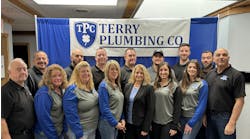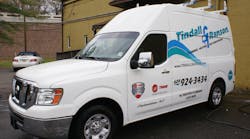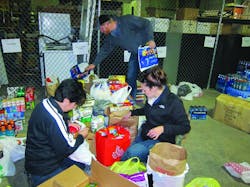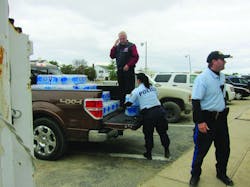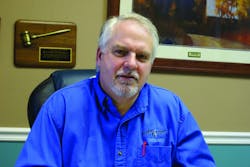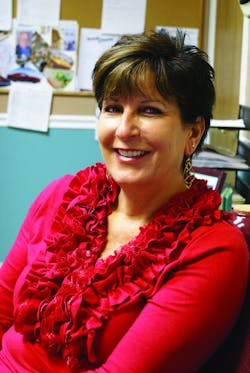Latest from Plumbing Contractor
Sponsored
“We volunteer because of what the industry has done for us,” says Kathy Tindall. It’s hard to imagine that the industry has done more for the Tindalls than they have done for the industry.
Kevin and Kathy Tindall are the owners of Tindall & Ranson Plumbing, Heating & Air Conditioning, Princeton, N.J., and this year’s CONTRACTOR magazine Contractor of the Year.
The list of their previous volunteerism is exhaustive, but get a load of what they’ve just done in the past month.
Even 50 miles from the ocean, the Princeton area in Mercer, Middlesex and Somerset Counties suffered from downed trees and power lines. When CONTRACTOR visited with the Tindalls they still did not have power at their own home. And yet they considered themselves pretty well off and immediately volunteered to help their extended “family” on hard-hit Long Beach Island on the Jersey Shore. The Tindall’s vacation home in Beach Haven Park on Long Beach Island is up on pilings, so it suffered little damage. First responders on the island, however, were in dire straights. Long Beach Township Emergency Operations Center, the Beach Haven EOC and the Beach Haven, Surf City and Ship Bottom Fire Departments had no electricity, plumbing or drinking water. The Toms River Fire Department had lost its firehouse.
Thanks to the efforts of their daughter, Heather Alkhateeb, the Tindalls were able to launch a major relief effort for Long Beach Island. Heather, who’s a photographer and a social media maven who manages all of their Internet and social media initiatives, was able to spread the word in the community that the Tindalls were headed to LBI with all the relief supplies that they could carry. Heather spread the news through Princeton’s 101.5 FM, on Tindall & Ranson’s Facebook page, on its website, and on the website www.PrincetonScoop.com. The community responded.
Some of them, Kevin said, have homes there. Some community members may have had grandparents with homes on the island or had vacationed there in the past. They turned out in force, filling the Tindall’s warehouse with drinking water, cleaning supplies, bleach, fruits and vegetables and hundreds of pairs of dry socks. One couple from western Pennsylvania with fond memories of LBI got up at 4:00 AM to drive to the Tindalls with an SUV full of supplies. Community members unloaded their supplies 10 at a time into the Tindall & Ranson warehouse. The Tindalls have made two trips to the island and they’ve given some of their relief supplies to others to carry.
People seem to assume that plumbing will always be there and in this case it wasn’t. The one gift that made some first responders cry was the trailer-load of porta-potties that the Tindalls took to LBI. Now Kevin has to get a pumper service to Long Beach Island to get them emptied.
Kevin, as is his nature, was nonchalant about it. “What else are you going to do on a Saturday,” he said, “Sit on the couch and watch college football?”
Volunteerism is a constant with Tindall. He joined PHCC in 1993 because his first partner, Todd Ranson, was involved. He first got involved with the association locally in Mercer County and it mushroomed from there. He was the president of PHCC of New Jersey, (he is currently state treasurer) and he has chaired the state’s education and insurance committees. He became a Zone 1 director for PHCC-NA, serving the northeastern states from 2005 to 2008.
He served as PHCC President Frank Maddalon’s secretary in 2010-2011, which led to his decision to run for vice president this year. He enjoys giving back to the industry, saying it’s as good a time as any that he’s had. Moreover, he and Kathy have the business evolved to a point where he doesn’t need to be present 100% of the time.
Kathy is also an inveterate volunteer with the PHCC Auxiliary. She joined the board for the first time in 1999 as secretary and served as president in 2004-2005. She has been secretary three times.
Tindall & Ranson contributes to a scholarship fund in honor of the late Fran Williams, a past president of PHCC and a past chairman of the PHCC Educational Foundation, Kathy says. Tindall & Ranson gives $1,000 every year. The scholarship goes to a student in the medical field and they must be related to an Auxiliary member and sponsored by an Auxiliary member. The Auxiliary gave out $41,500 in 2012 in 34 scholarships.
Sustainable efforts
PHCC President Jim Finley appointed him to the PHCC Green Task Force in 2007. That Green Task Force led to the signing of a Memorandum of Understanding between PHCC, the EPA WaterSense program and the Alliance for Water Efficiency in 2009. Back in 2007 green was in its infancy. He got involved in his first LEED project, a grocery store, and didn’t know all the things he needed to do because, as a residential contractor, he hadn’t been involved in the U.S. Green Building Council or LEED or in green construction. (The first version of LEED for Homes was released in 2008. NAHB and ICC got together in 2007 to write ICC 700, the National Green Building Standard.) Kevin saw the need for residential and light commercial contractors to get involved. He’s been involved in PHCC’s efforts to write a residential green contractor testing and certification program. The program is in beta testing now and the test should be ready by March.
Kevin is now chairman of the PHCC’s Green Task Force and has testified before Congress in Washington on behalf of small business about, “The Role of Green Technology and Ensuring Economic Growth.”
It’s in that role as the chairman of the PHCC Green Task Force that Kevin holds a seat on the IAPMO Green Technical Committee. Before that he was a member of IAPMO’s precursor group C.A.U.S.E., the Committee for the Awareness and Understanding of a Sustainable Environment. The committee was created to lead IAPMO’s environmental efforts, and its first move was to call for an immediate 10% reduction in water and energy use through the Uniform Plumbing Code and the Uniform Mechanical Code. The GTC was created to further that work. Kevin has been a member of the GTC from the start and he wants to stay on it.
To top it all off, he was president of the West Windsor Volunteer Fire Department for 15 years. His training as a firefighter served him well when he pulled a man out of a burning car in 2005, an act of heroism for which he won both state and local commendations.
Sitting on those green committees isn’t for show. He’s gotten plenty of business from it.
Marketing, selling green
Kevin encountered a unique challenge when he began marketing his plumbing company’s green services to homeowners in southern New Jersey. When he told them how much it would cost to upgrade their plumbing and mechanical systems to new high-efficiency, money-saving alternatives, Kevin discovered a different kind of sticker shock.
It seems “free” isn’t a word most people are accustomed to hearing from their plumbing contractor. But by taking advantage of government grants and rebates, that’s exactly the price Kevin can offer.
“You can’t afford not to embrace this stuff,” Kevin says of green technology. “The only problem is when you tell the customers they’re essentially getting the new system for free, they don’t believe you.”
By informing potential clients about the benefits available to them through the New Jersey Clean Energy Program, Kevin can deliver on his promise. Residents can receive $4,000 to $5,000 in grants and rebates and could also be eligible for as much as $10,000 in interest free loans.
With new construction projects few and far between, Kevin was looking for a way to separate his business from the competition. His company began doing energy audits, demonstrating how installing a solar thermal or geothermal system could save customers up to 20% on their energy bills. These retrofits have been the lifeblood of his thriving business for the past three years.
Kevin has also found a growing niche in residential energy services through his affiliation with the Building Performance Institute.
He’s certified by the Building Performance Institute and has one man performing $400,000 in energy auditing work. BPI can be a hassle — they want him to be 100% BPI work within three years and that may force him to spin off his energy service work into a separate company. Nevertheless, the $25,000-$30,000 in BPI startup costs have been offset by a niche market that’s bringing in $400,000 to $450,000 a year.
He credits BPI with being the first organization to aggressively go after air sealing in structures. The problem is that there are no consensus standards for the work.
Financial incentives exist — homeowners can get a $10,000 interest-free loan and a $5,000 grant from New Jersey Clean Energy if the retrofit can be documented to reduce energy consumption by 25%. In order to get the money, the homeowner has to air seal the home and buy a new heating system and water heater. If the retrofit can save $83 or more a month, it will offset the loans costs to perform the work, he said. Tindall also pointed out that air sealing often eliminates the need to zone the house.
How it all started
Tindall got into plumbing the same way as so many in the industry — slowly through a first job as a kid. He worked for his brother-in-law in 1974 as a shop boy, and then started his apprenticeship with United Association Local 380 (which is now Local 9). By the time he was 25 or 26-years-old he was running jobs at Princeton. After becoming service manager, he built the service department to 15 men and $2 million in volume in 1991.
He was itching to run his own show, but his brother-in-law and other area contractors weren’t in the market for a partner. He took the big leap, forming Tindall & Ranson right before Christmas, December 12, 1993, with the official start of business January 1, 1994. Todd Ranson, who had been in business before and held the plumbing license, was a 10% shareholder. Ranson brought along a truck and a few customers. On Day One it was four guys plus Kathy and Todd’s wife in the office.
Tindall & Ranson billed $800,000 that first year, all of it residential service or high-end renovation, split about equally between plumbing and HVAC. Ranson was bought out in 1995. The firm billed between $1.1 million and $1.2 million its second year and hit $3.6 million in 2007 before the recession started. He actually lost money in 2007, then was flat in ’08 and ’09, made some money in ‘10 and then was flat again in ’11. This year, buoyed by more aggressive marketing, he’s up 20%. He has 15 men working for him, three full-time in service with a fourth as a floater. The rest do contract construction and custom renovation work for builders, installing HVAC and bathrooms and kitchens.
Kevin expects to have plenty of work to do in the near future. While Kevin and Kathy didn’t charge to the rescue at Long Beach Island because they expected repayment, Kevin anticipates two years of work repairing plumbing and HVAC systems on the island. Most of those they’ll be servicing are the best customers you can have, those with the wherewithal to own second homes. You can add to that all of the good will they’ve created in the Princeton area and their schedule will be filled for quite a while.
Robert P. Mader
Bob Mader is the Editorial Director for Penton's mechanical systems brands, including CONTRACTOR magazine, Contracting Business and HPAC Engineering, all of which are part of Penton’s Energy and Buildings Group. He has been with CONTRACTOR since 1984 and with Penton since 2001. His passions are helping contractors improve their businesses, saving energy and the issue of safeguarding our drinking water. He is a graduate of the University of Notre Dame with an A.B. in American Studies with a Communications Concentration.

